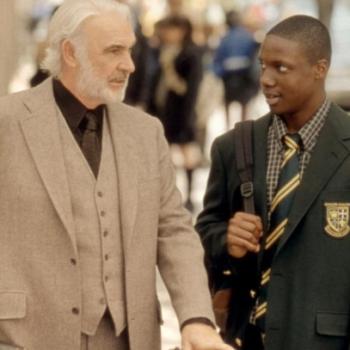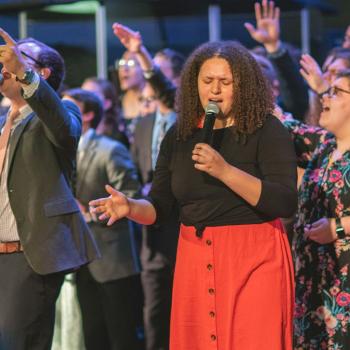
Shane Claiborne is one of the founders of the New Monastic movement and is a member of the Potter Street Christian community in Philadelphia. His 2006 book, The Irresistible Revolution: Living as an Ordinary Radical, has shaped much progressive Christian thinking about living as Jesus taught. His story as told in Christianity Today explains the experiences that have led him to pursue service to the poor and nonviolent activism.
For Patheos' series on the Future of Evangelicalism, he spoke by phone with Timothy Dalrymple.
Before we speak of the future, I want to discuss your past and present, with some general questions for people who might not know you. You spent ten weeks serving the poor alongside Mother Teresa in Calcutta. What are some of the most important things you learned during those weeks?
There is so much I learned. One lesson, ironically, was that you don't have to go across the world to find your calling, to find God, or to find the poor. Mother Teresa had a great line that, if we only have eyes to see, Calcutta is everywhere. That really was much of what fueled the vision to start our community here in Philadelphia, which is kind of our "Calcutta."
Mother Teresa also never got too infatuated with the big dream for changing the world -- a quality that I find really admirable. One of her most famous lines is that we cannot do great things, but only simple things with great love. It's not how much you do that matters, but how much love you put into every act, and the intentionality with which you live every day. Hoping to do small things with great love is still a big part of our charism and vision here.
The other thing that I observed of Mother Teresa, something particularly relevant in the world that we live in, is that she wasn't motivated by guilt; she was motivated out of joy and love. At one point, one of the journalists said to her, "I wouldn't do what you do for a million dollars." She said, "I wouldn't do it for a million dollars either, but I would do it because it's what we are made for." That's really what captivated the world's attention when it comes to Mother Teresa. She lived with selflessness, and I think, deep down, many people know that she was right. That is what we are created for. The more we have, the less we are. The more we are concerned with our own life, as Jesus said, the more we lose it.
You have helped to pioneer something called the New Monastic movement. How would you summarize the essential elements of that movement?
Well, "New Monasticism" was not the terminology we used when we started things here. But as you may know, our community started out of a housing struggle, where homeless families were living in an abandoned cathedral. We got involved in that. As we were a part of that movement in 1995, we began to see that, wow, this is challenging a lot of what we would consider church. What does it mean to be the church? That's when we looked in the book of Acts, and we saw all these believers were together and shared everything they had.
We also looked at church history and saw that there were these renewal movements, like in the 13th century, when Francis of Assisi heard the whisper of God, "Repair my Church, for it is in ruins." In a lot of ways, it was humbling to realize that we weren't doing anything truly new. It was fresh for today, but rethinking what it means to be the church is something that happens over and over every few centuries.
What we learn from the monastic tradition is that it begins with the single-minded pursuit of God and neighbor -- "to will one thing," as Kierkegaard said, wholeheartedly seeking the kingdom of God. Monasticism has often put together beliefs with practices and lifelong commitments, so that Christianity is more than a presentation of ideas. It becomes a lifestyle.
You are known to cite Kierkegaard, the 19th-century Danish religious thinker. There are certainly ways in which I can see his critique of Christendom in what you wrote. How has Kierkegaard inspired you? And what are some other major inspirations?





